Palestinian resistance: The gun or the olive branch?
By Khaled Diab
The death and destruction inflicted by Israel's assault on Gaza point to the futility of Palestinian armed resistance. Peaceful resistance is the way.
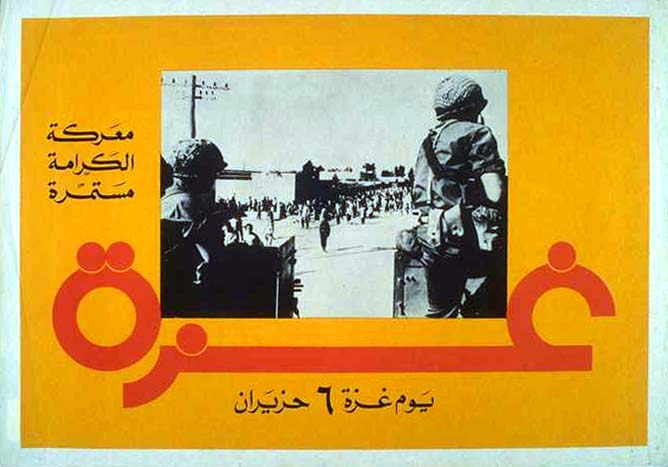
Source: http://www.palestineposterproject.org/poster/gaza-day
Sunday 27 July 2014
The war in Gaza has exacted a heavy human and humanitarian toll on the long-suffering civilian population there, especially for children and women. At least 925 Palestinians have been killed, of which at least 676 are civilians, including 206 children, according to UN figures.
The images of the suffering, anguish and pain have provoked an enormous sense of outrage, anger and despair amongst Palestinians outside the strip.
Hamas's barrage of primitive and puny rockets may have been physically targeted at Israel but ideologically their intended recipient seems to be arch-rivals Fatah, and its negotiated approach to the conflict.
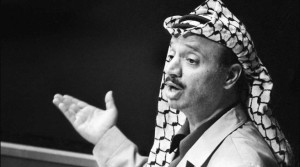
Forty years ago, in 1974, Yasser Arafat stood before the UN General Assembly and declared: “I have come bearing an olive branch and a freedom fighter's gun. Do not let the olive branch fall from my hand.”
During the intervening years, the PLO packed away its “freedom fighter's gun” in favour of the peace process. However, the net result has been that the life of Palestinians today is worse than it was when there were no formal agreements between the two sides. Prior to Oslo, Palestinians had freedom of movement across all of Israel and Palestine and were not strangled in by settlements.
It is no wonder that the olive branch looks like it has fallen irretrievably out of the feeble hands of Mahmoud Abbas, whose gestures of peace remain unrequited by the Israelis and whose Palestinian Authority has, in many ways, become a security contractor for the Israeli occupation.
And there is a rising public sense here that armed struggle is inevitable. “Till we have a viable and independent Palestinian state, the Palestinian people have the right to resist the Israeli occupation and domination in any and all ways possible,” contends Imad Karam, a Gazan filmmaker and peace activist currently based in the UK.
“I really dislike Hamas but what they're doing against Israel is the right thing,” a Jerusalemite friend told me, echoing an increasingly common sentiment.
“Israel has got to feel that there is a cost to its actions. It needs to get some of the same sense of fear and anguish we feel,” another said.
Hamas's rockets are a “symbolic and radical assertion of an indigenous people's unbending will to live with dignity in their ancestral homeland,” described Susan Abulhawa, the Palestinian author of the critically acclaimed book Mornings in Jenin, in a public post on her Facebook page. “They are the minimal acts of self-defence of a people against whom unspeakable crimes have never ceased in 60 years.”
Palestine's increasingly successful peaceful popular resistance movements have also been caught in the crossfire. “This is the most aggressive Israeli war and one which hit families hardest, but we have not seen in the past such Palestinian unity and support behind the resistance,” says Karam. “A sign would be the general mood in both Gaza and the West Bank which is one that is proud and supportive of the resistance and their achievements, despite the hefty cost.”
Some even mock and ridicule the very notion of peaceful resistance. Rana Baker, a London-based Gazan, asked mockingly, in an article for openDemocracy, whether Palestinians “should grab guitars, pianos, and white ribbons, look up at their oppressors flying over their heads in apaches and F16s, and sing a lullaby of peace”.
Baker even justifies the targeting of civilians, which is a war crime, through the convoluted logic that “Palestinians fire rockets into what belongs to them in the first place.” In a show of dangerous self-deception, she even believes that armed resistance must continue “until Palestine is liberated, and by Palestine I mean historical Palestine.”
Such hardening maximalist nationalism in some Palestinian quarters is a product of disappointment and disillusionment at the failure of the peace process to deliver an independent state or even equality, only a state of segregation, settlements and walls.
But can armed struggle deliver justice for Palestinians where negotiations have failed? Judging by the long annals of the Arab-Israeli conflict, armed struggle has been a double-edged sword, with the edge facing the Palestinians digging much deeper and causing more pain.
In fact, in almost every military confrontation the Palestinians and Arabs have had with the Israelis, Israel has come out on top, with Palestinians paying a heavy price for the loss. Yet for advocates of the way of the gun such overwhelming evidence is ignored, or perhaps irrelevant.
“I remain convinced that there is no military solution to this conflict,” says Karam, recognising the futility of armed conflict in the Israeli-Palestinian context. “No matter how hard Israel hits our people, the Palestinian people will simply not give up until our legitimate demands for freedom are fulfilled, and no matter how far our rockets reach in Israel, they will not bring a solution to the conflict.”
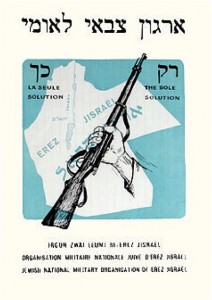
This is a lesson which Israel repeatedly refuses to learn, preferring the so-called “deterrence” of military brutality to the employment of soft power and the tackling of the underlying causes.
Karam still sees a future for unarmed Palestinian resistance, even in Gaza. “In my view, popular and non-violent resistance is the best way forward to achieve our national aspirations, alongside political negotiations,” he asserts. “However, it is difficult to apply this in Gaza which is blockaded and I don't see an end to armed resistance from Gaza unless at least the blockade is lifted.”
Personally, I am convinced that non-violent resistance need not wait for a lifting of the blockade and, in fact, in a situation where Palestinians are seriously outgunned, peaceful protest can outsmart the Israeli military, leading to the lifting of the siege.
In fact, the most significant gains made by the Palestinian cause came through peaceful means. This is reflected in the first intifdada, when ordinary, humble, unarmed but dedicated Palestinians almost brought Israel to its knees. That the opportunities for peace and justice this threw up were manipulated in ill faith by too many Israeli leaders and squandered by the PLO does not detract from the power of popular, peaceful resistance.
Palestinian peace activist Sulaiman Khatib believes this apparent surge in support for armed struggle is passing and is fuelled by outrage and powerlessness at what is happening to the population of Gaza. “When people see all the images from Gaza, there is a shift in the balance between violent and non-violent struggle. But this is only temporary,” he told me.
“The large disparity in power in Gaza confirms my conviction that violence – or armed resistance – is not the way. The best way to change and combat the occupation is through non-violence.”
Khatib is the co-founder of Combatants for Peace, a group of ex-fighters, both Palestinians and Israelis, who “decided to put down our guns, and to fight for peace”.
This organisation didn't get off to an easy birth. At the first-ever meeting of ex-Israeli and Palestinian combatants the air was thick with distrust, loathing, disagreement and, above all, fear. The Palestinians and Israelis were both paranoid that the meeting might be a trap.
Today, they are a well-organised and effective, if still relatively minor movement. In keeping with their ethos, they held a joint Arab-Jewish protest, albeit a small one, against the Gaza war. “We also need co-resistance,” emphasises Khatib.
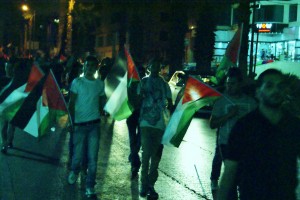
Last week's large peaceful protest in Qalandia is a clear sign that unarmed resistance has certainly not yet run its course in Palestine.
And it doesn't end there. The Palestinian grassroots weave together a long and loose web of activists and groups who employ only peaceful means: from the likes of Bassem Tamimi, the school teacher who became an anti-settlement activist in Nabi Salih to Emad Burnat, the farmer who became an Oscar-nominated filmmaker to protest the Israeli wall in Bil'in.
____
Follow Khaled Diab on Twitter.
This is an updated and extended version of an article which originally appeared in The National on 23 July 2014.

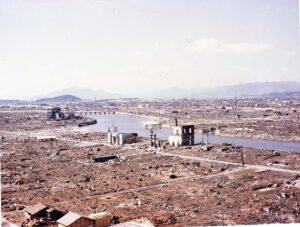

Pingback: Gaza's Catch-22s - The Markaz Review